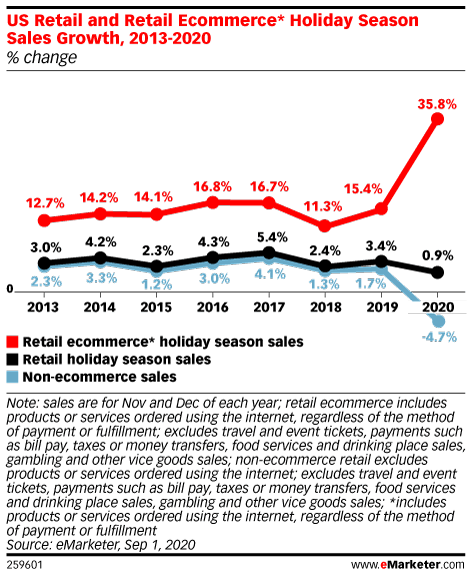The fate of Black Friday is in serious jeopardy.
Historically known as the biggest shopping day of the year, Black Friday was traditionally a day of waiting on long lines in the wee hours of the morning and hustling through crowded stores in order to snag great deals on wish list items. And though experts and analysts have been suggesting the demise of Black Friday over recent years due to the rising popularity of online shopping, the pandemic that we are currently living through may be enough to end these doorbusters forever.
Now that we are in November, we are technically into the holiday shopping season. Retailers have spent the past weeks and months trying to best figure out how to approach this very unusual and challenging holiday season. They not only have the responsibility of creating a safe shopping environment for customers and employees – social distancing, shorter store opening times, and ramped up hygiene protocols, for example – but also ongoing inventory issues that have come about as a result of the pandemic. And in the meantime, a global recession lingers in the background that means that customers are likely to be cash strapped and less willing to splurge.
So things are definitely going to be different. This is the first time in roughly a decade that stores have decided to not open on Thanksgiving Day. Walmart, Target, Best Buy, Kohl’s and others have already announced they will keep their stores closed on Thanksgiving, which is usually when they kick off their in-store Black Friday sales. And large, in-store events will most likely fall by the wayside as stores aim to keep crowds at bay.
Yet, retailers insist Black Friday is not cancelled. Just because the mad dash likely won’t exist this year doesn’t mean in-store shopping will be nonexistent. As Black Friday is a normal business day, stores may be open. However, we might see stores offering limited-capacity pared-down Black Friday sales — or requiring Black Friday shoppers to register for (or purchase) a time slot to shop. Perhaps there might even be a lottery system where a certain amount of shoppers are allowed to shop in-store at a certain time. Still, total in-store holiday sales will declinefrom 2019 by 4.7%.

The good news is that ecommerce will make up for the losses taken by brick-and-mortar. eMarketer predicts growth of 0.9% for total holiday season sales, to $1.013 trillion. And Black Friday itself will experience its first-ever $10 billion spending day, rising 39.4% year over year.
Since online shopping does not have the same restrictions as in-store, we can expect sales and discounts to begin even earlier this year. Some retailers started their Black Friday promotions in October, with Amazon, Walmart and Target’s big sale events leading the way. Some smaller retailers waited until the start of November, so many retailers are well under way with their Black Friday offerings. It is not limited to just one weekend this year.
Curbside pickup will play a big part in shoppers’ Black Friday plans this year. Many retailers began their curbside operations during the height of the pandemic and many consumers feel most comfortable with this option. This is great for those who don’t want to risk shipping delays due to the surge in ecommerce, but who also don’t want to physically set foot in a store.
But retailers still need to find a way to generate the frenzy and excitement that we are used to seeing on Black Friday. One possible way might be to use new technology, like AR (augmented reality) and VR (virtual reality). If not this year, then possibly in future years, we may see AR ad circulars where you can scan QR codes and see special deals and product information on your phone. For example, say you are a dedicated magazine reader — you could see special QR codes within the pages that take you to the products advertised at a retailer like Amazon, Best Buy, or Walmart. Readers may have access to special Black Friday deals that they can scan from print publications (or social feeds) as the shopping holiday turns more virtual.
And speaking of virtual, there are already some companies, like Youcan, that are creating virtual retail spaces that let you feel like you’re actually shopping at your favorite stores. This makes it more fun for some to hunt for deals without having to leave your home.
Although the new technology could be exciting, be prepared for technical issues that could result from a large influx of online traffic, like slow loading times and pages crashing. Plan ahead and make a list of the big ticket items you want and be quick to add them to your cart and check out to make sure they don’t go out of stock before you can buy them. This is the like the virtual version of fighting over an item on the shelf with another shopper.
Like everything else this year, Black Friday will be a little weird, but retailers are bent on making it just as lucrative as every other year. Many businesses are on the brink of bankruptcy and looking to end this year on a high note. So look out for ingenuity and creativity in driving traffic to ecommerce.
Keep an eye out for more insight from SMB Media Consulting as we navigate this unprecedented holiday season!



